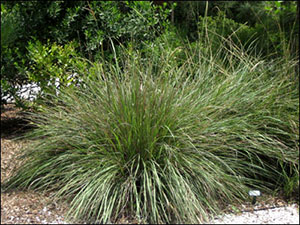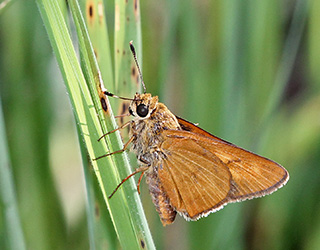Fakahatchee Grass
Fakahatchee grass brings a touch of native Florida into your landscape and adds texture to any yard.

Sometimes called Eastern gamagrass, this plant forms a large clump that works well as an accent plant or planted as a border. As an added bonus, Fakahatchee grass is the larval food plant for the Byssus skipper butterfly.
Fakahatchee grass is frequently found growing along river banks, hammocks, swamps, and other wet sites throughout most of Florida. It is easy to grow, easy to propagate, and makes a wonderful addition to any garden.
Characteristics
Fakahatchee grass (Tripsacum dactyloides) has tall, green, grass-like foliage rising upright to form clumps that are between 4 and 6 feet tall and wide. The leaves have small, sharp teeth along their edges. The inconspicuous flowers can be white, pink, yellow, or rust colored. They appear in late spring on stout spikes that rise above the leaves.
The grassy texture of these plants can add a bit of character to your yard. Fakahatchee grass can grow to be quite large, so if you’re short on space, there’s a dwarf Fakahatchee that may be a better option. Dwarf Fakahatchee grass—sometimes called Tripsacum floridanum—only grows to two to three feet.
Planting and Care

Photo by Mary Kelm, some rights reserved.
Both Fakahatchee grass and the dwarf cultivars can be grown in zones 8 to 11. They will grow best in full sun but can handle partial shade. These plants grow best in wet or irrigated sites, but can adapt to dry sites. Not only do they look good as an accent plant or a border, they can be used to stabilize slopes or banks.
These grasses need well-drained to moderately well-drained soil for best results. Fakahatchee grass is moderately drought tolerant and is tolerant of standing water or flooding. It will brown and dieback if exposed to extended periods of below-freezing temperatures, but it returns in the spring. In sub-tropical areas Fakahatchee grass is evergreen.
This perennial grass can be pruned if you want to cut it back a bit, but it doesn’t need this to thrive. Fakahatchee grass can be a great addition to the landscape and requires almost no maintenance.

Also on Gardening Solutions
More from UF/IFAS
- Fakahatchee Grass: Tripsacum dactyloides (PDF)
- A New Database on Trait-based Selection of Stormwater Pond Plants
